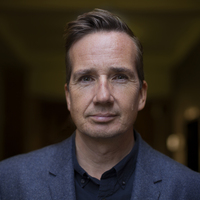Richard Sandell

Professor of Museum Studies and Co-Director of the Research Centre for Museums and Galleries, School of Museum Studies at the University of Leicester.
Activity
-
Richard Sandell replied to Claire Jerry
Thanks for this Claire - all of us here in the School - and at National Museums Liverpool - have been following the debates with great interest. I am especially pleased to see some people change their views a little! Glad you're enjoying the course!
-
Brilliant point - well made Sylvia!
-
Richard Sandell replied to Sylvia Baker
Thanks for this feedback and your thoughtful reflections Sylvia - very much appreciated!
-
Hi Terri
What was so great about the exhibition was that it was located right at the heart of the main Museum of Liverpool - visited by thousands of people coming for a day out. Unusually, it wasn't hidden away in a side gallery but front and centre for all visitors to see - really powerful I think.
-
Thanks for your lovely feedback Miranda - I have to say that Sarah and her colleagues achieved something very original and significant with this exhibition. There are lots more film clips and materials here if you are interested in looking further - http://www2.le.ac.uk/departments/museumstudies/exhibitions-and-events/100stories
-
Hi Elizabeth - you can view it here - http://www2.le.ac.uk/departments/museumstudies/exhibitions-and-events/100stories/here-and-now-film-installation
Very best - Richard
-
Great to read people's reactions to the work of the ISM. There seems to be a sense from some that it is appropriate for museums that deal explicitly with human rights abuses to take up a particular standpoint on issues but not necessarily for all museums... I would question this ... and in the remainder of the week we are going to look at ways in which more...
-
Thanks Linda - Glad you're enjoying it.
-
Museums can make use of history to engage visitors in debates about contemporary issues and debates that are very live today - or overlooked; issues around which there may be limited consensus. There are some very powerful examples of museums doing this although the majority tend to avoid it. The examples that follow this week will help us think this through...
-
Thanks for this helpful discussion Timothy. I have written more about the interplay between global ideas of human rights and localised norms related to justice in 'Museums and the Human Rights Frame' for anyone who wants to look into this more fully. Thanks Timothy - enjoy the rest of the week.
-
Some really helpful points here Robert. My main argument is that all museums are political - they all communicate particular ideas that have social justice implications - whether they choose to actively do this or not. They do this through the decisions they make about what to collect and display and how they present it. Silences can be as political as...
-
Great questions Richard and a good example too. In the examples that follow this week, we're going to look further at this idea of 'taking sides' and why I think there are very good reasons why museums should be willing to do this more.
-
Richard Sandell replied to Linda Nicholls
Thanks Dan. I would argue that the onus is on museums to answer this - to get to know communities, to understand them better through research and dialogue.
-
Richard Sandell replied to Margaret S
See, for example, the statistics David Fleming discusses in 'Museums, Society, Inequality.
-
Richard Sandell replied to Margaret S
Hi Steve - results are indeed important and change in visitor profiles can take time ... but Tyne and Wear Museums managed to achieve extraordinary long term shifts in their visiting profile and National Museums Liverpool are doing the same - gowing visitors and reflecting community diversity in their audiences.
-
Richard Sandell replied to Linda Nicholls
Hi Dan - I think the key word you highlight is 'choice'. Working with and researching people who don't visit museums over many years shows that many people don't get to make this 'informed choice' because of the numerous factors that restrict their opportunities. I am not suggesting museum visiting is obligatory - but everyone should have the opportunity to...
-
Thanks very much for these thoughtful reflections Fiona. I think my concern is that many museums and galleries still present material as if it is representative rather than 'selective' as you point out. One way to challenge preconceptions is to encourage visitors to understand the political implications bound up in the decisions we have made (and still make)...
-
I agree, Fiona. Museums that reflect community diversity can challenge how people see and understand the world around them. We know from research that museums not only 'reflect' society... They can actively shape it - they can inform the conversations we have about difference and social justice. More on this later in the course!
-
Richard Sandell made a comment
Great to see these discussions. We'll be looking at barriers to access soon & thinking about how museums can (and, in my view, why they SHOULD) make sustained efforts to engage those audiences that feel museums are not for them.
-
Richard Sandell replied to Linda Nicholls
Thanks for this Linda. My starting point has always been that museums enrich and can change peoples's lives in powerful ways - so we need to better understand and address why many people in society are denied access to these experiences and resources.
-
Richard Sandell replied to Ken McLeod
Really delighted to hear that the course has offered ways of thinking that you can make practical use of Ken - hope you enjoy week 2 as well!
